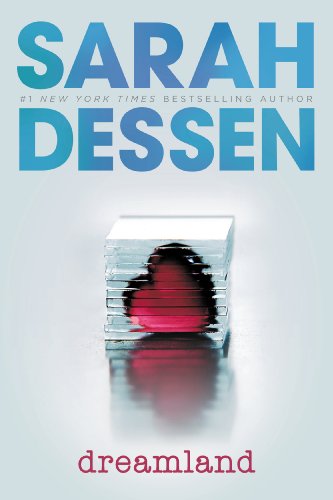All Nonfiction
- Bullying
- Books
- Academic
- Author Interviews
- Celebrity interviews
- College Articles
- College Essays
- Educator of the Year
- Heroes
- Interviews
- Memoir
- Personal Experience
- Sports
- Travel & Culture
All Opinions
- Bullying
- Current Events / Politics
- Discrimination
- Drugs / Alcohol / Smoking
- Entertainment / Celebrities
- Environment
- Love / Relationships
- Movies / Music / TV
- Pop Culture / Trends
- School / College
- Social Issues / Civics
- Spirituality / Religion
- Sports / Hobbies
All Hot Topics
- Bullying
- Community Service
- Environment
- Health
- Letters to the Editor
- Pride & Prejudice
- What Matters
- Back
Summer Guide
- Program Links
- Program Reviews
- Back
College Guide
- College Links
- College Reviews
- College Essays
- College Articles
- Back
Dreamland by Sarah Dessen
“I was worn out, broken: He had taken almost everything. But he’d been all I’d had, all this time. And when the police led him away, I pulled out of the hands of all these loved one, sobbing, screaming, everything hurting, to try and make him stay.”
Dreamland by Sarah Dessen journeys into a world not often covered in teen fiction, the ins and outs of an abusive dating relationship. But while books on this topic may be rare, the violence is not.
Nearly 1.5 million high school students nationwide experience physical abuse from a dating partner in a single year.
This translates to one in 10 high school students who have been purposefully hit, slapped or physically hurt by a boyfriend or girlfriend, according to loveisrespect.org.
Dreamland is not a book with a happy “ride off into the sunset” ending. But it does have a hopeful ending.
And after reading it, going through a roller coaster of highs and lows with Caitlin, the star of the story and the voice of the scene above, the reader recognizes that that hope is possibly the most precious thing in the world.
The story begins when Caitlin’s “perfect” sister, Cass O’Koren, runs away with her bouncer boyfriend, Caitlin’s idea of perfection is destroyed and her entire world, and her parent’s world, is completely rearranged.
To try to repair her particularly fractured relationship with her mother, Caitlin joins the cheerleading squad, but after a short period of being on the cheer squad, Caitlin gets into an accident.
She falls from the top of a pyramid of girls and while she is not hurt, she becomes very unsettled.
It’s after that close call, that Caitlin meets Rogerson Biscoe. After seeing him from afar at a gas station, she and her friends leave for a party that Rogerson shows up at. He doesn’t go to Caitlin’s school, but came to bring drugs for the partiers. And when he leaves he extends an invitation to Caitlin to come with him. She does.
This is a huge step in the path to Caitlin’s ultimate destruction. And it’s the step that felt most unbelievable.
Overall, Dreamland was a realistic book, but the idea that right after meeting someone, a drug dealer to boot, one would just leave with him, all alone in his car, seems suspicious.
But Dessen manages to explain through Caitlin’s voice that she is doing this because it is something that she had never done before, and it was something that Cass had never done.
At first, Rogerson make Caitlin feel secure and loved, it’s during this honeymoon period, that Rogerson introduces Caitlin to drugs, primarily pot, and to Corinna, a twenty something high school grad who was disowned by her parents after running away with her boyfriend, Dave.
Soon if Caitlin’s not with Rogerson, she’s chain smoking with Corinna.
This leads to Caitlin’s old life decreasing in importance. She loses friends and eventually her spot on the cheer team.
Rogerson is starting to be very controlling in this period, and an alarm may start to go off in the readers head.
And then the abuse starts. The first time Rogerson hits Caitlin he apologizes for hours, being extra caring to try to make up for it, but over time the abuse becomes common.
Caitlin only felt safe after she had been hit, because she knew she would have a brief grace period where Rogerson would be as attentive as possible.
This is when Caitlin enters the “dreamland”. She is almost a ghost drifting through her life as if in a daze. Reading Dreamland, the reader often feels like they have joined Caitlin in her gray life, and although from that outside perspective, it was clear that what Rogerson was doing was horrendous, Dessen did a superb job of showing the reader how to Caitlin, the abuse was almost not registering.
Even though Rogerson had taken Caitlin’s innocence away, throughout the story she would still reach for him through the pain he had inflicted, which is common in abused women. Caitlin, like many, was clinging to the “fact” that Rogerson “loved” her.
This is something most will not understand until seeing the abuse from the victim’s perspective, which is what Dreamland does.
The reader feels the deep costs of this abuse, both mentally and physically, and it is seen that a symptom of the disease is the abandonment of reason.
Although the prince didn’t get the girl, in fact, there was no prince to begin with, Dreamland’s ending still left me, as a reader, feeling like the right things had been done.
The hope that Caitlin feels about her future life is amazing. Her strength, to break through her dreamland, into the real world, is something that will stick with you.
Similar Articles
JOIN THE DISCUSSION
This article has 0 comments.

